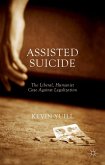This book questions how abortion laws can be regulated in a time when abortion rights are still subject to intense debate.
It addresses objections to basing abortion law on considerations of moral risk, presents two anti-abortion arguments - the deprivation argument and the substance view - to demonstrate the risk of permitting abortion, and discusses the moral risk of restricting access to abortion when it may unjustifiably harm women. The author also shows how welfare states can address the negative effects of restrictive abortion laws by preventive, mitigative and compensatory measures.
This is a thought-provoking and challenging book that will be of great interest to those considering abortion laws across the fields of medical ethics, bioethics, moral philosophy, law and politics.
It addresses objections to basing abortion law on considerations of moral risk, presents two anti-abortion arguments - the deprivation argument and the substance view - to demonstrate the risk of permitting abortion, and discusses the moral risk of restricting access to abortion when it may unjustifiably harm women. The author also shows how welfare states can address the negative effects of restrictive abortion laws by preventive, mitigative and compensatory measures.
This is a thought-provoking and challenging book that will be of great interest to those considering abortion laws across the fields of medical ethics, bioethics, moral philosophy, law and politics.








